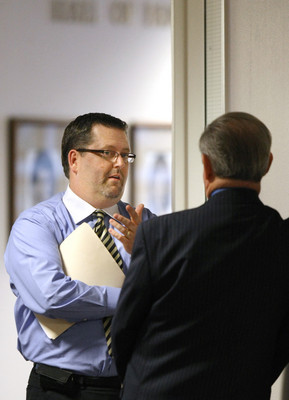Bill increases time for public workers to retire

CARSON CITY — A bill introduced in the state Senate on Tuesday morning would require newly hired police officers and firefighters to be on the job five years longer, and other new public employees two years longer, before receiving full retirement benefits.
The bill would require that state and local government employees hired after this year work 30 years to receive full retirement benefits and be on the job longer to receive partial benefits. Police and firefighters now can receive full benefits after 25 years on the job. Other public employees hired since 2001 can receive full benefits after 28 years on the job.
Senate Bill 427, scheduled for a Thursday hearing before the Senate Finance Committee, is designed to help shore up the Public Employees Retirement System, which actuaries have estimated is $6 billion short of what is needed to cover its current long-term obligations.
Republican lawmakers say that they won’t support tax increases this session without reforms to the retirement program for state and local government employees. They also say that the PERS bill doesn’t go far enough, and that they will continue to negotiate for more substantive reforms.
“We believe that in 30 years when the average age of someone dying is 90, that (PERS) employees at least ought to be required to work until they are 62 before retiring,” said Sen. Warren Hardy, R-Las Vegas, who has been negotiating for PERS reforms. “We think you should work 32 years before you are fully vested in the system.”
PERS Executive Officer Dana Bilyeu said legislators cannot reduce the benefits of existing employees according to the law and court rulings.
She does not yet have estimates of the savings that would result in coming years from the changes in the bills.
“The savings will come 20 years, 30 years from now,” Bilyeu said.
Under the bill, police, firefighters and regular PERS members all must work 30 years to receive full retirement benefits. Police and firefighters who now can retire at age 50 and receive partial benefits if they have worked 20 years would have to wait until they turned 55 to retire. Regular members who now can retire at age 60 and receive partial benefits if they have at least 10 years on the job would not be able to retire until they turn 62 under the bill.
For most of PERS’ existence, 30 years of service was required before a regular employee could retire and receive full benefits. In 2001, that was reduced to 28 years for newly hired employees.
SB427 would return to the 30-year requirement, although Hardy said he wants the bill changed to require newly hired PERS members to work 32 years before they receive full retirement.
He also does not want anyone, regardless of years of service, to receive benefits before 62 — the age at which people in the private sector can collect Social Security benefits.
David Kallas, the lobbyist for the Las Vegas Police Protective Association, said the union won’t fight the plan to require new officers to work 30 years before receiving full benefits.
But he will protest the changes that would require a 20-year employee to wait until he or she turns 55 before retiring.
Kallas questions if the public wants 55-year-old police officers chasing robbers or someone high on PCP, or a firefighter of that age carrying people out of burning buildings. He said police and firefighters work strenuous jobs and might not be able to perform as well at older ages.
Nearly 104,000 state and local government workers and teachers and school staff members are PERS members. Another 37,000 retired workers are receiving benefits.
The system has about $18 billion invested to pay for their benefits, but lost more than $4 billion from its peak because of the decline of the stock market since October 2007.












